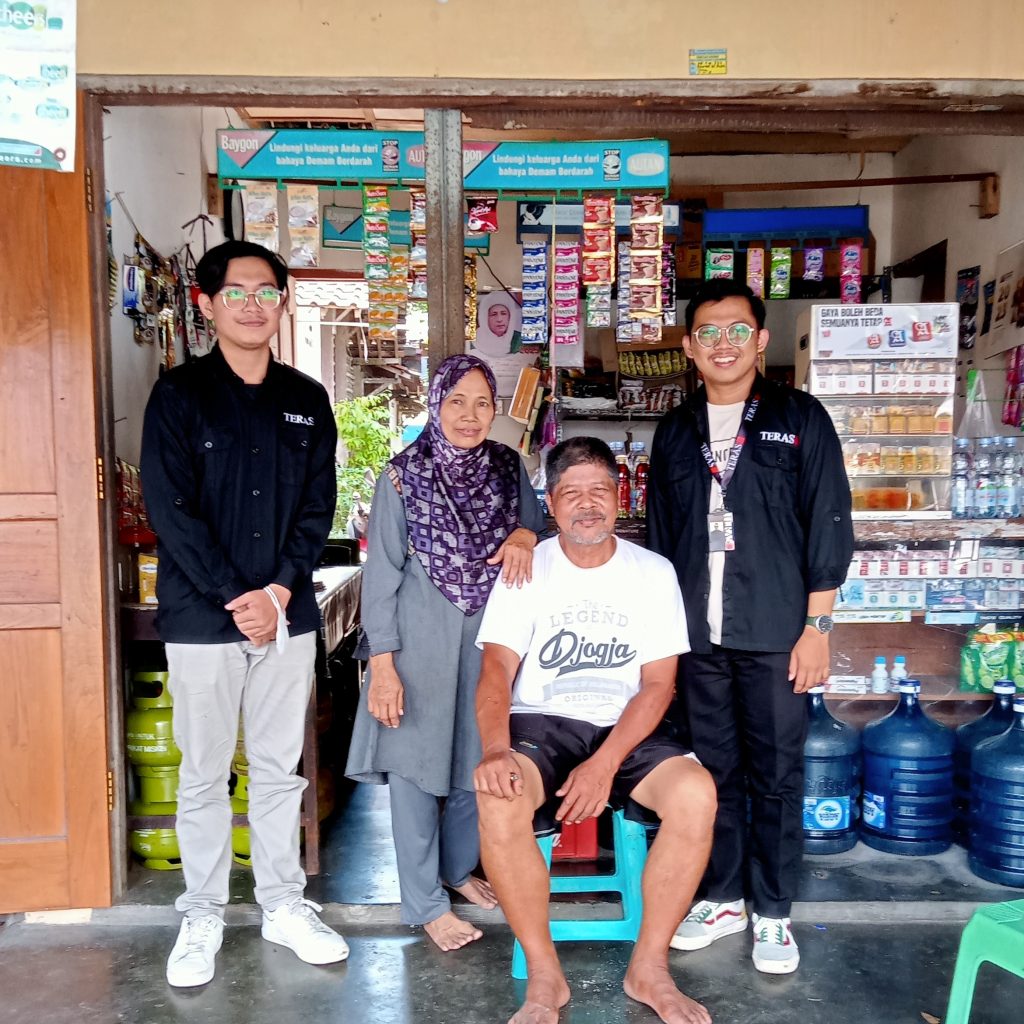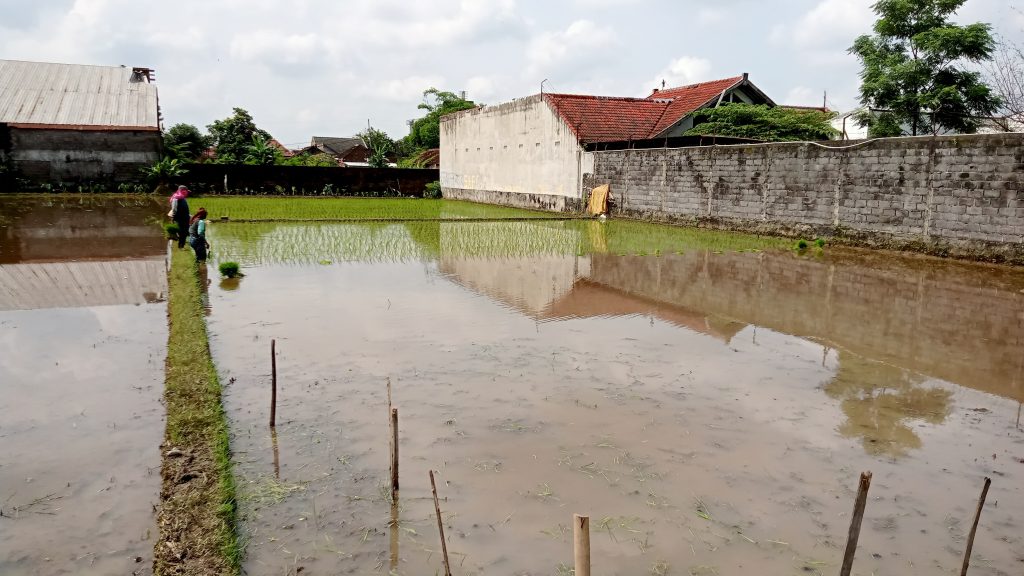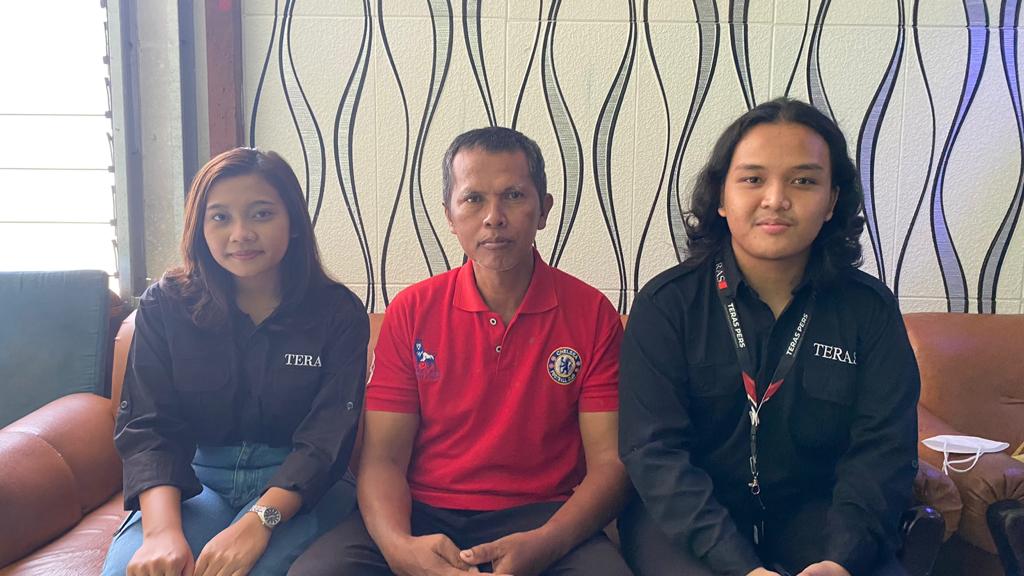Agricultural land in Kledokan which is directly next to the cafe
Agricultural land in the Kledokan area, Yogyakarta, is narrowing due to the massive development in the region. Cafes and residential areas are slowly replacing the rice fields.
*****
The rice harvested from Sumariani’s paddy fields is no longer as good it used to be. Its taste and texture have deteriorated. Sumariani harvested the rice from her family’s land, which is irrigated in the village of Kledokan, Sleman Regency, Special Region of Yogyakarta. “The water is now black and the mud is oily,” said Sumariani to Teras Pers on 17 December 2022.
According to Sumariani, the quality of the irrigation water has declined since the construction of cafes that happening around her rice fields. The hangout spots and coffee shops produce waste and plastic trash that are suspected to be the cause the contamination problems on the irrigation channel.

Having three rice fields with an area of 50 acres, Sumariani and her family cultivate the land to meet their family’s needs. She spends around IDR 1.25 million per planting season. The money is used to buy seeds, fertilizer, rent a tractor, and pay laborers.
Sumariani mentioned that the capital spent is not proportional to the harvest obtained. The declining quality of rice has led to drop in selling price of rice. Therefore, Sumariani plans to sell some of her fields.”The efforts and results obtained are not balanced,” said this 60 year old woman.
The Kledokan village was originally a fertile rice field area. Farmers irrigated their rice fields from Selokan Mataram, which passes through this village. Selokan Mataram is an irrigation canal that connects the Progo River with Opak River. Completed in 1944, this channel became a source of water for agricultural land in Yogyakarta.
Agricultural land in Kledokan changed function as the construction of offices, campuses, and settlements in the area increased. Initially, there were only the National Nuclear Energy Agency’s office and the Sahid Yogyakarta Hotel in Babarsari Street. Atma Jaya Yogyakarta University and the “Veteran” National Development University followed later. Kledokan also became a dense residential area due to the emergence of houses, boarding houses, and shops.

Selokan Mataram which is the source of irrigation, can no longer be relied upon. The Head of the Gawe Rukun ing Tani (Garuni) Farmers Group, Sumino, said that the government had closed the irrigation water gate Kledokan village since September last year. Farmers have been having difficulty finding water source. “We have stopped cultivating the fields,” said Sumino.

The difficulties of farmers in Kledokan are increasing due to a decreases in incentives. According to Sumino, the distribution of rice seeds aid was stopped since 2015. Farmers only receives subsidies for purchasing the fertilizer.
Some Kledokan residents still persevere in farming even though they no longer have a land. They work on land owned by their hamlet. One of them is Sunikmari. She rents a piece of lands for IDR 1000 per square meter per year.
Sunikmari said that the hamlet government plans to increase the rental price to the Rp 4000 per square meter. Farmers objected to the new price. “This land can be turned into lots because no farmers are renting it,” she said.
Farmers and the governmet are currently still negotiating to determine a new rental price. Both parties agree that the rental fee per square meter should be Rp 2000, but there is no written agreement yet. “Kledokan can no longer be used as agricultural land because its infrastructure does not support it,” said Sunikmari.
Team news:
- Henrikus Harkrismoyo Vianney
- Yohanes Wibisono
- Nindasari
- Stefanus Lukito Adiyanto
- Bernardino Realino Arya Bagaskara
- Christoforus Jeremy
- Kristoferus Lokanatha Prabaswara Dewanto
Translated by : Kristoferus Lokanatha Prabaswara Dewanto
